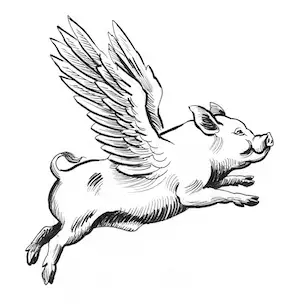‘Pigs might fly’ is a humorous/ironic remark, used to indicate the unlikeliness of some event or to mock the credulity of others. For example:
“I might make a start on papering the back bedroom tomorrow”.
“Yes, and pigs might fly”.
‘Pigs might fly’ is a humorous/ironic remark, used to indicate the unlikeliness of some event or to mock the credulity of others. For example:
“I might make a start on papering the back bedroom tomorrow”.
“Yes, and pigs might fly”.
The literalists amongst us all know that pigs can fly. After all, newspapers keep saying ‘swine flu’.
‘Pigs might fly’, or as some would have it ‘pigs may fly’, is an example of an adynaton, that is, a figure of speech that uses inflated comparison to such an extent as to suggest complete impossibility. Other examples are ‘It is easier for a camel to pass through the eye of a needle…’ and ‘Make a mountain out of a molehill’. The version of the phrase more often used in America is ‘when pigs fly’.
A correspondent recently drew my attention to a book by John Winthrop and wondered if it might be the origin of the expression ‘pigs might fly’. Winthrop was an English Puritan explorer who settled in Massachusetts in 1630 and recounted his story in The History of New England, 1630-1649, which was transcribed from Winthrop’s 17th century notes and published in 1908:
In this year one James Everell, a sober, discreet man, and two others, saw a great light in the night at Muddy River. When it stood still, it flamed up, and was about three yards square; when it ran, it was contracted into the figure of a swine: it ran as swift as an arrow towards Charlton, and so up and down about two or three hours.
Whether Everett and his pals had been at the fermented cranberry juice or whether they were the first to record an attempted alien abduction we don’t know, but we can be sure that their visions weren’t the source of the popular saying.
The original version of the succinct ‘pigs might fly’ was ‘pigs fly with their tails forward’, which is first found in a list of proverbs in the 1616 edition of John Withals’s English-Latin dictionary – A Shorte Dictionarie for Yonge Begynners:
Pigs fly in the ayre with their tayles forward.
This form of the expression was in use for two hundred years as a sarcastic rejoinder to any overly optimistic prediction made by the gullible, much as we now use “…and pigs might fly”.
Why pigs? Other creatures were previously cited in similar phrases – ‘snails may fly’, ‘cows might fly’ etc., but it is pigs have stood the test of time as the favoured image of an animal that is particularly unsuited to flight. It is probably the bulkiness of the creatures and their habit of rooting in earth that suggests an intensely ramping nature […and it’s nice to have an opportunity to sneak in the little-used ‘ramping’, which means no more nor less than ‘unable to fly’].
Thomas Fuller, in Gnomologia: A Collection of the Proverbs, Maxims and Adages That Inspired Benjamin Franklin and Poor Richard’s Almanack, 1732, was the first to explicitly single out the pig as a ham-fisted aeronaut:
That is as likely as to see an Hog fly.
The first example that I can find of our currently used ‘pigs may fly/pigs might fly’ form is from The Autobiography of Jack Ketch By Charles Whitehead, 1835:
Yes, pigs may fly, but they’re very unlikely birds.
Having an autobiography that is written by someone else is commonplace in the celebrity-obsessed 21st century, but wasn’t in Ketch’s day. Ketch was the executioner employed by Charles II and his days were lived out in the 17th century, so, unless our eponymous hangman really was a ghost writer, we have to assume the words of an ‘autobiography’ written 150 years after his death were Whitehead’s rather than his.
Flying pigs appeared in print in the UK quite often throughout the rest of the 19th century. The Illustrated Times referred to them in an issue in August 1855:
…pigs might fly. An elephant, too, might dance on the tight-rope,
Lewis Carroll also conjured one up in Alice’s Adventures in Wonderland, 1865:
“I’ve a right to think,” said Alice sharply… “Just about as much right,” said the Duchess, “as pigs have to fly.”
It can’t be long before another correspondent adds to the list of unlikely origins of ‘the whole nine yards’ and suggests that it derives from Winthrop’s ‘three yards square’ flaming aerial pig.
In 1909, in a jokey attempt to prove that pigs can take flight, the pioneer aviator Baron Brabazon of Tara, better known to his friends as John Theodore Cuthbert Moore Brabazon, took a piglet aloft in his private biplane, strapped into a wastepaper basket.
Other ‘pig’ phrases:
Pig’s back – on the
(In a) pig’s eye
Trend of when pigs fly in printed material over time

A B C D E F G H I J K L M N O P Q R S T UV W XYZ
American Animals Australian Bible Body Colour Conflict Death Devil Dogs Emotions Euphemism Family Fashion Food French Horses ‘Jack’ Luck Money Military Music Names Nature Nautical Numbers Politics Religion Shakespeare Stupidity Entertainment Weather Women Work
Have you spotted something that needs updated on this page? We review all feedback we receive to ensure that we provide the most accurate and up to date information on phrases.